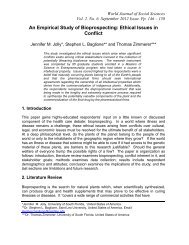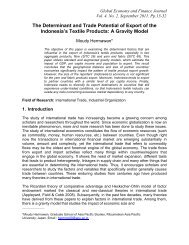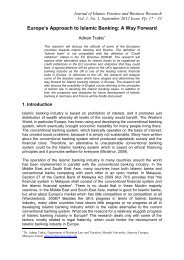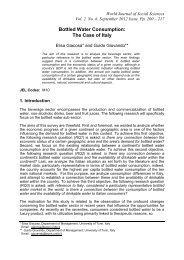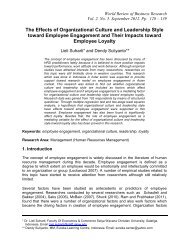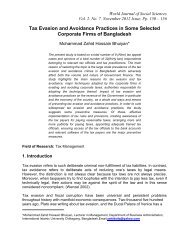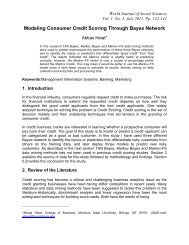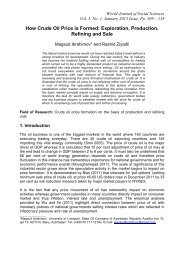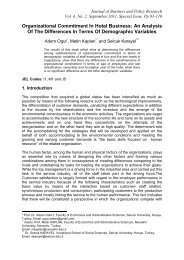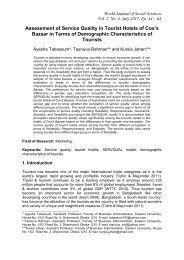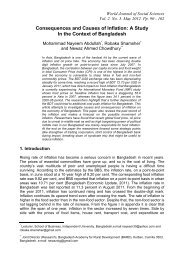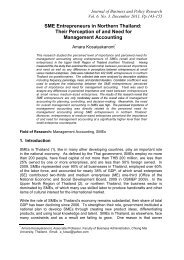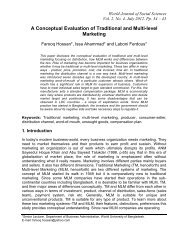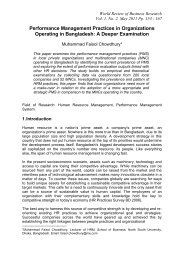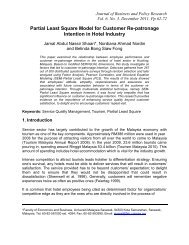(Islamic Insurance) Operating Models in Malaysia - Wbiaus.org
(Islamic Insurance) Operating Models in Malaysia - Wbiaus.org
(Islamic Insurance) Operating Models in Malaysia - Wbiaus.org
You also want an ePaper? Increase the reach of your titles
YUMPU automatically turns print PDFs into web optimized ePapers that Google loves.
Htay & Zahar<strong>in</strong><br />
3. When did your company adopt this model to manage the Family Takaful<br />
fund, i.e. current model?<br />
The TOs adopt the current model ever s<strong>in</strong>ce their set up of the Family Takaful<br />
product.<br />
4. Has your company ever used another model prior to the current adopted<br />
model? If yes, what are the reasons that your company changed to the<br />
current adopted model?<br />
The TOs have been us<strong>in</strong>g the current model s<strong>in</strong>ce the <strong>in</strong>troduction of their<br />
Family Takaful product <strong>in</strong> the company.<br />
4.2 Effect of Adopted Takaful <strong>Operat<strong>in</strong>g</strong> Model on the Surplus Distribution<br />
In order to make <strong>in</strong>quiries of how the Takaful operat<strong>in</strong>g model affects surplus<br />
distribution, the follow<strong>in</strong>g six <strong>in</strong>terview questions are developed and the summary<br />
<strong>in</strong>terview results are as follows:<br />
1. Based on the company’s current practice, is the surplus of the<br />
underwrit<strong>in</strong>g <strong>in</strong> the PSA shared between participant and shareholders? If it<br />
is shared, is it stated <strong>in</strong> the contract (aqad) and what is the ratio?<br />
The surplus of the underwrit<strong>in</strong>g <strong>in</strong> the PSA is absolutely shared between the<br />
participants and the shareholders and this practice is def<strong>in</strong>itely mentioned <strong>in</strong><br />
the contract. The TOs believed that the ratio depends on the type of product<br />
(The Family Takaful product has variety of options and categories). However,<br />
the <strong>in</strong>terviewees <strong>in</strong>cluded that most participants are unaware of this situation<br />
because they do not read the contract and are lack of understand<strong>in</strong>g about the<br />
whole product.<br />
2. Does your company charge certa<strong>in</strong> management expenses <strong>in</strong> manag<strong>in</strong>g the<br />
Fund? If yes, is the percentage charged stated <strong>in</strong> the contract (aqad)?<br />
The practice <strong>in</strong>cludes the management expenses under the Wakalah fee and<br />
it is def<strong>in</strong>itely mentioned <strong>in</strong> the contract.<br />
3. Is the profit from <strong>in</strong>vestment of Family Takaful Fund be<strong>in</strong>g shared between<br />
Shareholders and Participant? If shared, what is the Shari’ah view on this?<br />
The profit derived from the <strong>in</strong>vestment of the Participant’s account is shared<br />
between the shareholders and the participants. Some of the <strong>in</strong>terviewees<br />
support this practice because they th<strong>in</strong>k that the TOs earn it for the effort of<br />
<strong>in</strong>vest<strong>in</strong>g the amount <strong>in</strong> the Participant’s account. Nevertheless, some<br />
<strong>in</strong>terviewees see this practice as excessive and unfair because the TOs have<br />
already taken a lot from the Wakalah fee and the underwrit<strong>in</strong>g surplus.<br />
121



